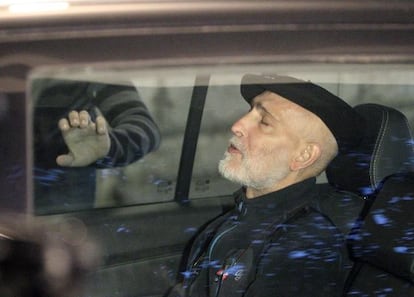Cancer-ridden ETA inmate discharged from hospital
Victims’ association feels “cheated” by granting of release to Uribetxebarria Bolinaga, sentenced to 32-year term


ETA inmate Iosu Uribetxebarria Bolinaga, who is suffering from terminal cancer, left the Hospital Donostia on Tuesday evening having been granted conditional release by the High Court. The decision in September to parole the convicted terrorist, who was involved in a high-profile kidnapping case in the late 1990s, angered victims groups as well as high-profile members of the conservative Popular Party.
Having been discharged by doctors, Bolinaga walked out of the hospital on Tuesday accompanied by his brother and a representative of a collective that is campaigning for ETA prisoners to be transferred to jails in the Basque Country. Bolinaga, who was wearing a beret carrying the logo of the prisoner pressure group, was then driven to his home in Mondragón, Gipuzkoa.
Kidnapping
Bolinaga was convicted for the kidnap of José Antonio Ortega Lara, a former prison director, who was held by ETA for a total of 532 days before being rescued by the authorities. He was sentenced to 32 years in jail, but in mid-September was granted parole by a five-member panel of the High Court on the grounds that there was “a patent risk” to his life given the spread of cancer in his kidneys, brain and lungs. The release was granted against the wishes of the public prosecutor and the Justice Ministry, which opposed the decision.
The Association of the Victims of Terrorism (AVT) said that they felt “cheated” by Bolinaga’s release, calling the development “disastrous.” The president of the AVT, Ángeles Pedraza, told news agency Efe that she hoped that the move to his home in Mondragón was due to the worsening of his health, and not for other reasons, and that he would not be seen “holding rallies” any time soon.
ETA killed more than 800 people in its decades-long campaign for Basque independence, calling a “definitive” end to its violence in 2011.
Tu suscripción se está usando en otro dispositivo
¿Quieres añadir otro usuario a tu suscripción?
Si continúas leyendo en este dispositivo, no se podrá leer en el otro.
FlechaTu suscripción se está usando en otro dispositivo y solo puedes acceder a EL PAÍS desde un dispositivo a la vez.
Si quieres compartir tu cuenta, cambia tu suscripción a la modalidad Premium, así podrás añadir otro usuario. Cada uno accederá con su propia cuenta de email, lo que os permitirá personalizar vuestra experiencia en EL PAÍS.
¿Tienes una suscripción de empresa? Accede aquí para contratar más cuentas.
En el caso de no saber quién está usando tu cuenta, te recomendamos cambiar tu contraseña aquí.
Si decides continuar compartiendo tu cuenta, este mensaje se mostrará en tu dispositivo y en el de la otra persona que está usando tu cuenta de forma indefinida, afectando a tu experiencia de lectura. Puedes consultar aquí los términos y condiciones de la suscripción digital.








































